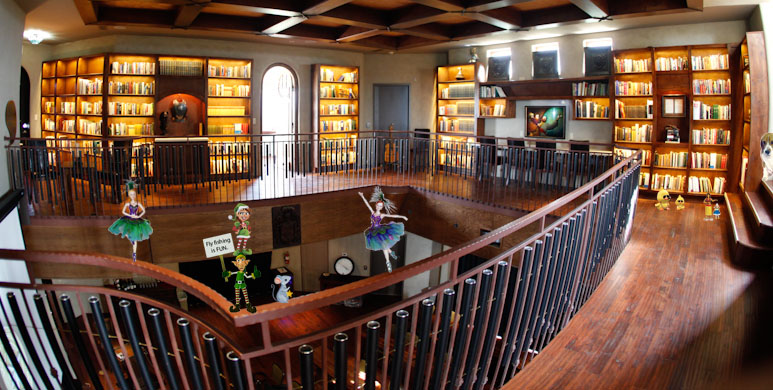I don’t know if he was was an American Patriot or a British Loyalist. All I know is that he owned a 1726 edition of “The Gentleman Angler,” a leather bound book on fly fishing.
That book was 50 years old when Thomas Jefferson penned the Declaration of Independence.
Speaking of Jefferson, that same fly-fisherman bought a first edition of the complete, 4-volume leather bound set of “Memoir, Correspondence, and Miscellanies” written by Thomas Jefferson and published in 1829. This leads me to believe that our fly-fishing friend purchased his 103-year-old copy of the 1726 edition of “The Gentleman Angler” at about that same time, roughly 200 years ago.
There were no modern books in his collection.
I just realized something. Our fly-fishing friend was obviously an American Patriot, or he would not have purchased Thomas Jefferson’s “Memoir, Correspondence, and Miscellanies” in 1829.
“Hang on a moment, Roy, you identified that man as a ‘Fly-Fishing Fanatic’ in the title of today’s MondayMorningMemo. What led you to call him that?”
I call him a “Fly-Fishing Fanatic” because the majority of the 18 books in his collection were about fly fishing, including a 1750 edition, a 1760 edition, and an 1823 edition of “The Compleat Angler” by Izaak Walton.
I bought his entire collection because books are cool, especially books that are centuries old.
What would have been REALLY cool, though, is if this lover-of-books who lived during the years of Thomas Jefferson, John Adams, Benjamin Franklin, Alexander Hamilton, and George Washington also owned an original, 1605 first-edition of Don Quixote de La Mancha. Wouldn’t that have been cool?
There are only 10 known copies of that book in all the world, and the last one to change hands sold 35 years ago for 1,500,000 dollars. There are no universities that own a copy, and there are no copies available to public view except the one that is owned by the citizens of the United States of America, and that one is closely guarded in our Library of Congress.
Did you guess already?
Our colonial fly-fishing friend did, in fact, own a 1605 edition of Cervantes’ masterpiece, and I bought it with the rest of his collection.
The mystery is that my copy is roughly 8 inches by 11 inches, much larger than the 4-inch by 6-inch edition owned by the Library of Congress. My copy is, without question, extraordinarily old. The attributes that bring me to this conclusion are not easily faked.
The cover is wrapped in the remains of old, brittle vellum – tightly stretched animal skin – and the pages are substantial and thick. It is not, however, the unauthorized pirated version published in Portugal in 1605, because mine has the correct 1605 frontispiece and title page, identical to that of the 4-inch by 6-inch 1605 edition held by the Library of Congress.
My copy has the vellum cover and ties, like the 1605 Portuguese edition and the 1620 English edition, but it is neither of those.
It appears to a centuries old Presentation Edition, if such a thing existed so long ago.
The print seems to occupy about the same dimensions as the smaller, first book, but the pages themselves are bigger and more substantial, as if the original press was used on larger paper, leaving a lot of unprinted paper bordering the original-sized text.
Meredith Mann, a specialist at the New York Public Library, writes,
“Don Quixote was first printed in Madrid in 1605. It was an immediate success—the first edition quickly sold out, and new ones were printed both in Spain and throughout Europe. I can’t neglect mentioning that the Rare Book Division holds one of these scarce early printings, in a contemporary and typically Spanish binding of limp vellum, labelled by hand on its spine.”
She wasn’t describing my book when she wrote that in 2015, but she might as well have been.
We have, for the moment at least, a rare and unidentifiable unicorn.
I have no doubt that my friends in the Cervantes Society will be happy to help identify our unicorn, and the Rare Book Division of the New York Public Library very generously offers to help answer questions for researchers.
In any event, I am content. My Don Quixote is old and rare and wonderful; beautiful on the inside, but outwardly rough and tattered like Quixote, himself. This Quixote reminds me of the Quixote within its pages; he began in a library, but then went out and did the things he had read about. This book has lived what Hunter S. Thompson was talking about when he said,
“Life should not be a journey to the grave with the intention of arriving safely in a pretty and well preserved body, but rather to skid in broadside in a cloud of smoke, thoroughly used up, totally worn out, and loudly proclaiming ‘Wow! What a Ride!'”
Until we know for sure exactly what it is, I will keep it in a safe deposit box at the bank. If it turns out to be as unique as it currently appears to be, Pennie and I plan to loan it to an American university that will keep it on display to the public. We have no stomach for hoarding treasure that might bring pleasure to others.
I will, however, keep my Thomas Jeffersons and my fly-fishing books in the grand library on the catwalk above the Eye-of-the-Storm lecture hall in the tower at Wizard Academy.
Anything can happen! Never forget that.
The best things in your life are yet to come. I see them in your future, waiting patiently for you to arrive so they can jump out and surprise you and make you dance with joy.
I smile, thinking about your happiness.
Merry Christmas.
Roy H. Williams
PS – I discovered this Colonial collection of books only because my friend Dewey Jenkins flew into town and gave me a large sum of money with which to, “go and find some more of those crazy things you love that always have interesting stories behind them.” Dewey came to Austin principally to celebrate our achievement of a wild and crazy goal we agreed upon 11 years ago. If you can find a copy of “Mr. Jenkins told Me,” I promise you will enjoy it and that it will teach you things that will make you a lot of money.
 Chris McShanag has worked alongside two physician entrepreneurs to build a business that provides virtual assistants to doctors, dentists, and veterinarians. The service worked so well that Chris and his partners finally realized it would work for any company. Many business owners contemplate moving from one business niche to another, but very few actually do it. This week, Chris McShanag shares with roving reporter Rotbart the ups and downs, and lessons gleaned from doing what has rarely been done. The time is now. The place is MondayMorningRadio.com
Chris McShanag has worked alongside two physician entrepreneurs to build a business that provides virtual assistants to doctors, dentists, and veterinarians. The service worked so well that Chris and his partners finally realized it would work for any company. Many business owners contemplate moving from one business niche to another, but very few actually do it. This week, Chris McShanag shares with roving reporter Rotbart the ups and downs, and lessons gleaned from doing what has rarely been done. The time is now. The place is MondayMorningRadio.com
